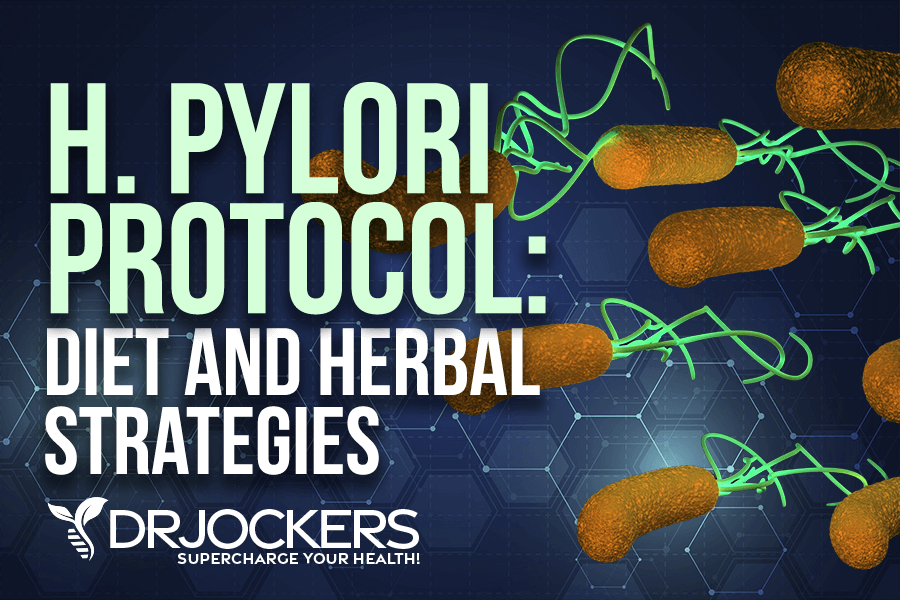 H Pylori Protocol: Diet & Herbal Strategies
H Pylori Protocol: Diet & Herbal Strategies
H pylori is a bacterium that grows inside your digestive tract and can damage your stomach’s protective lining causing chronic symptoms and health issues. H pylori infections are incredibly common. They are also difficult to eradicate, as they can be resistant to antibiotic treatment. However, with the help of some supplements, nutritional strategies, and lifestyle strategies, you may be able to reduce your symptoms and improve your health.
In this article, you will learn what H pylori is. I will discuss the problems with H pylori infections. You will understand the symptoms of H pylori infections. I will explain why H pylori infections are hard to eradicate. I will go over lab testing options for H pylori. I will share the best nutrition strategies for H pylori infections. Finally, I will share a H pylori protocol using targeted supplements.
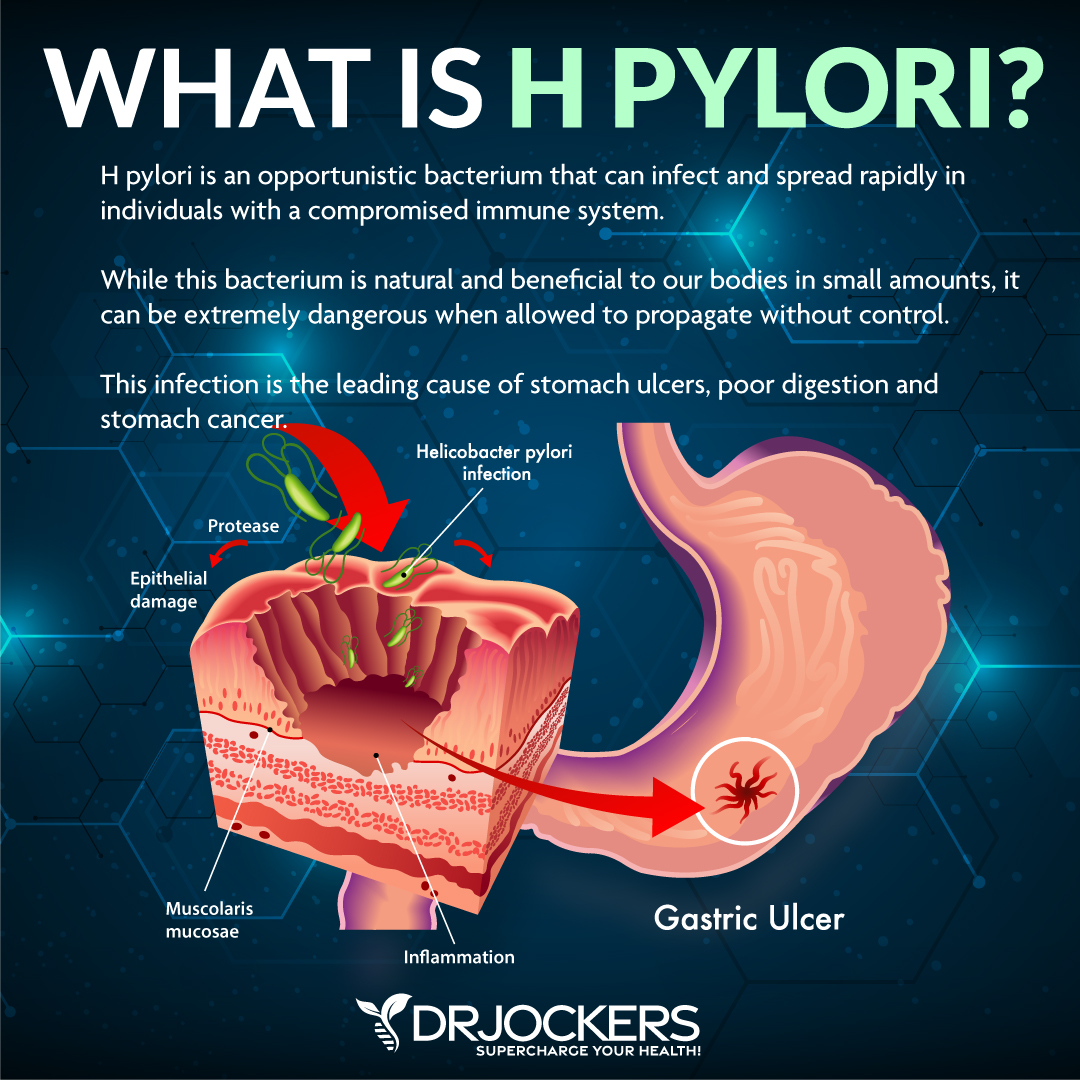
What Is H Pylori
Heliobacter pylori, or H pylori is a bacterium that grows inside your digestive tract. H pylori overgrowth can damage your stomach’s protective lining, causing digestive issues and other health complications.
According to a 2018 systematic review and meta-analysis published in Alimentary Pharmacology & Therapeutics, H pylori infections affect about 44.3 percent of the world’s population (1). Though it is more prevalent in developing countries at 50.8 percent, it is still common in developed countries at 34.7 percent. The prevalence is higher in adults (48.6 percent) compared to children (32.6 percent), and it’s slightly higher in men versus women (46.3 percent in males vs 42.7 percent in females).
According to a more recent 2022 review published in Children, the prevalence of H pylori in America is around 50 percent, while in Africa, it may be up to 70 percent (2). They found that the risk for children in Europe is around 25 percent. However, it depends on the country. In Portugal, the prevalence was around 66.2 percent under the age of 13.
Researchers noted that lower income levels, rural residence, crowded housing, overall poor living conditions, poor sanitation, poor hygiene strategies, eating raw uncooked vegetables or spicy food, smoking, and drinking may all increase the risk of H pylori infections.
Nonetheless, it’s clear that H pylori infections are a serious problem and are common even if you are living in a lower-risk environment. The H pylori bacteria is adapted to survive and thrive in the acidic environment of your stomach. However, it can also change the environment of your gut, decreasing its acidity. It may also penetrate the stomach lining. There it is protected by mucus, making it difficult for your immune cells to reach and destroy it.
Many people get infected with H pylori during a childhood stomach bug stint. However, you can get infected during your adult years as well. The problem is that H pylori doesn’t always cause symptoms but silently causes problems. It is a common underlying factor behind stomach ulcers, gastritis, other inflammatory stomach issues, and gastric and other digestive cancers (3).
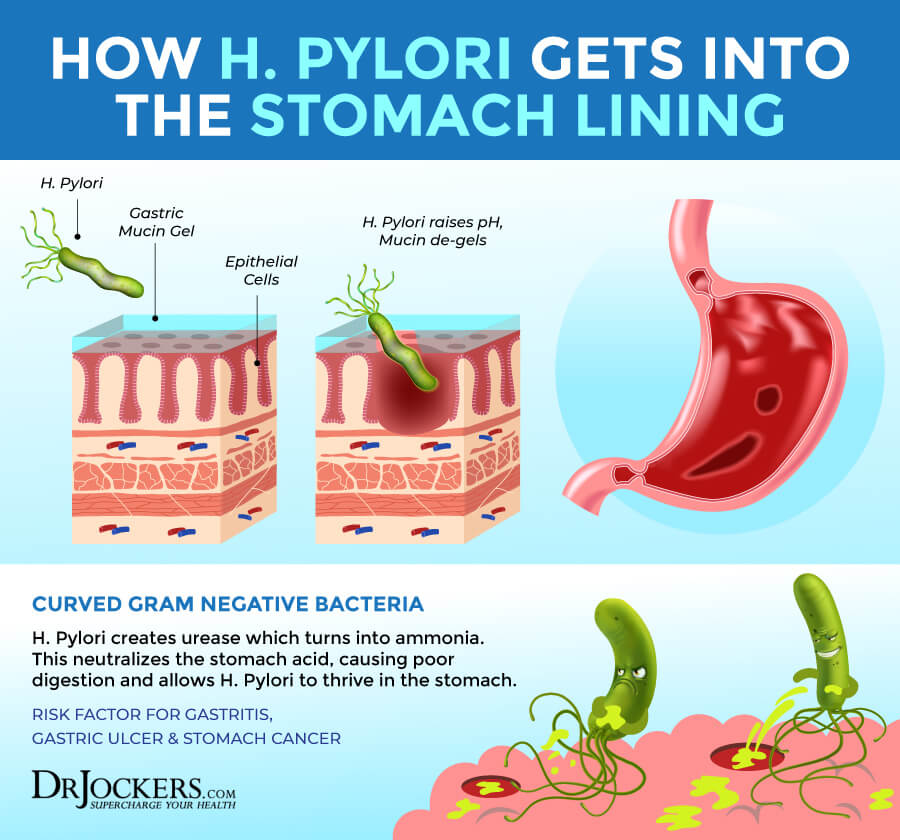
The Problems with an H Pylori Infection
H pylori is a very sophisticated and incredibly adaptable bacteria. It is able to survive in your stomach’s harsh, acidic environment. H pylori makes an enzyme called urease which helps to break down the urea in your stomach into carbon dioxide and ammonia. This can lead to bad breath (halitosis), belching, and acid reflux.
It also neutralizes the acidifying effects of hydrochloric acid in your stomach and makes your stomach environment less acidic. This may lead to a vicious cycle of poor digestion, nutrient malabsorption, the increase of inflammatory byproducts, inflammation, and chronic symptoms.
Your body needs hydrochloric acid to create an acidic environment, which is essential for ionizing minerals, digesting proteins, stimulating bile release from the gallbladder, and metabolizing fat in your small intestine. Without these key functions, h pylori overgrowth and poor stomach acid may increase the risk of anemia, osteoporosis, autoimmunity, and thyroid issues.
A 2021 study published in PLoS One has found that anemia may be a common issue linked to H pylori infection among dyspeptic patients (4). A 2020 study published in the Journal of Gastroenterology and Hepatology has found that osteoporosis may be more common in people with H pylori infections than in those without (5).
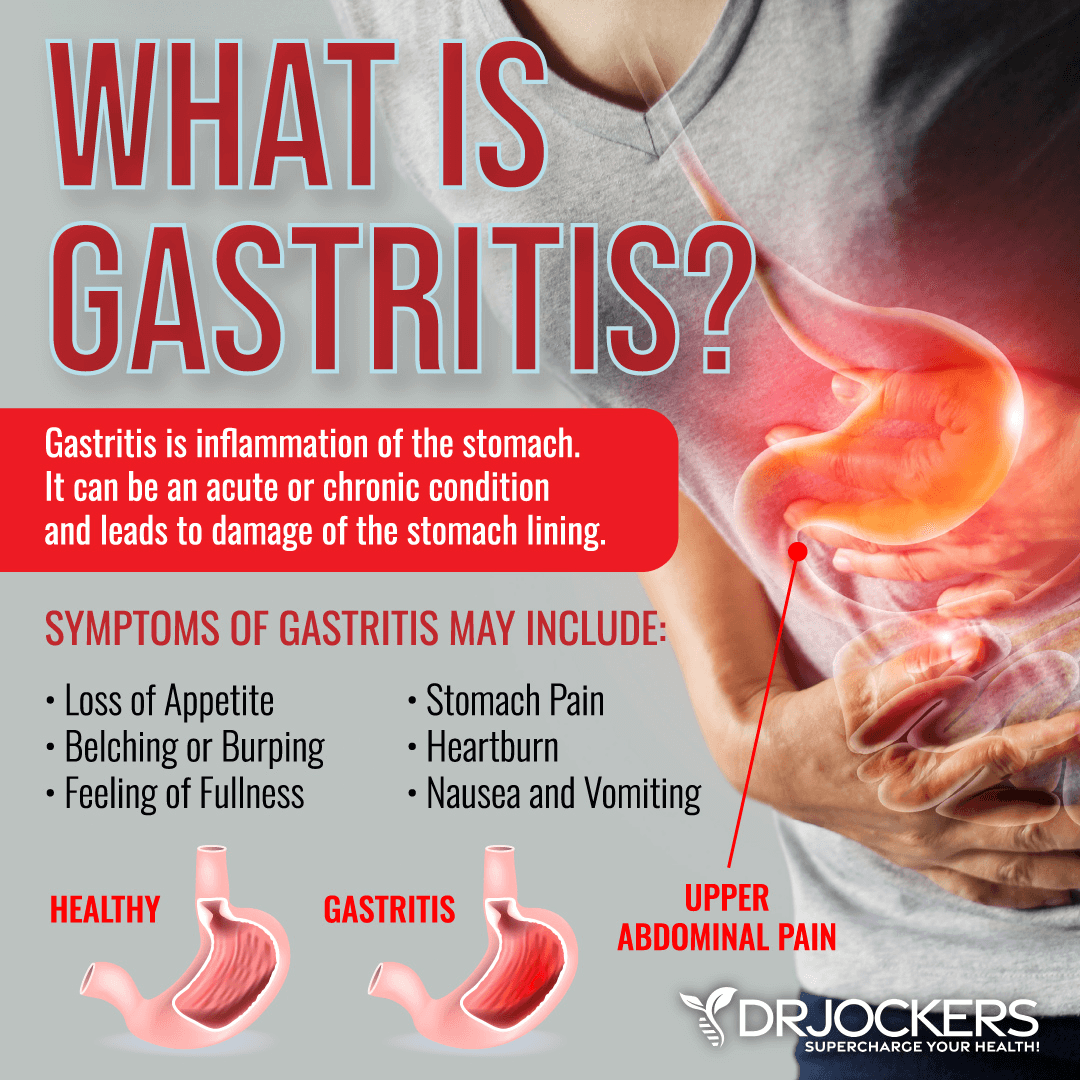
H Pylori and Stomach Cancer
According to a 2020 review published in Frontiers in Immunology, H pylori bacteria may be one of the potential risk factors for autoimmunity, “including inflammatory bowel disease, autoimmune thyroiditis, type 1 diabetes mellitus, autoimmune liver diseases, rheumatoid arthritis, idiopathic thrombocytopenic purpura, systemic lupus erythematosus, as well as Sjogren’s syndrome, chronic urticaria and psoriasis” (6).
Moreover, a 2022 study published in Frontiers in Pediatrics has linked H pylori infections with the risk of thyroid issues in children (7). And a 2020 study published in Antibiotics (Berlin) has linked it to an increased risk of autoimmune thyroiditis in adults (8).
Moreover, the secretion of mucous also protects your stomach lining from irritation by food and microorganisms. H Pylori may decrease your stomach’s ability to create mucous, which may lead to the irritation of the stomach lining.
This may also cause further digestive issues and inflammation. H pylori infections may increase the risk of gastritis, gastric ulcers, and gastric cancer (3). According to a 2023 study published in the International Journal of Molecular Sciences, H pylori is one of the main risk factors for gastric cancer (9).

Signs & Symptoms of H Pylori Infection
Signs and symptoms of an H pylori infection may include:
- Bloating
- Nausea
- Dull stomach pain or burning stomach pain, especially on an empty stomach.
- Unexplained weight loss
- Belching and acid reflux
- Vomiting
- Poor appetite
- Constant bad breath
- Hypochloridria
- Anemia
- Irritable bowel syndrome (IBS)
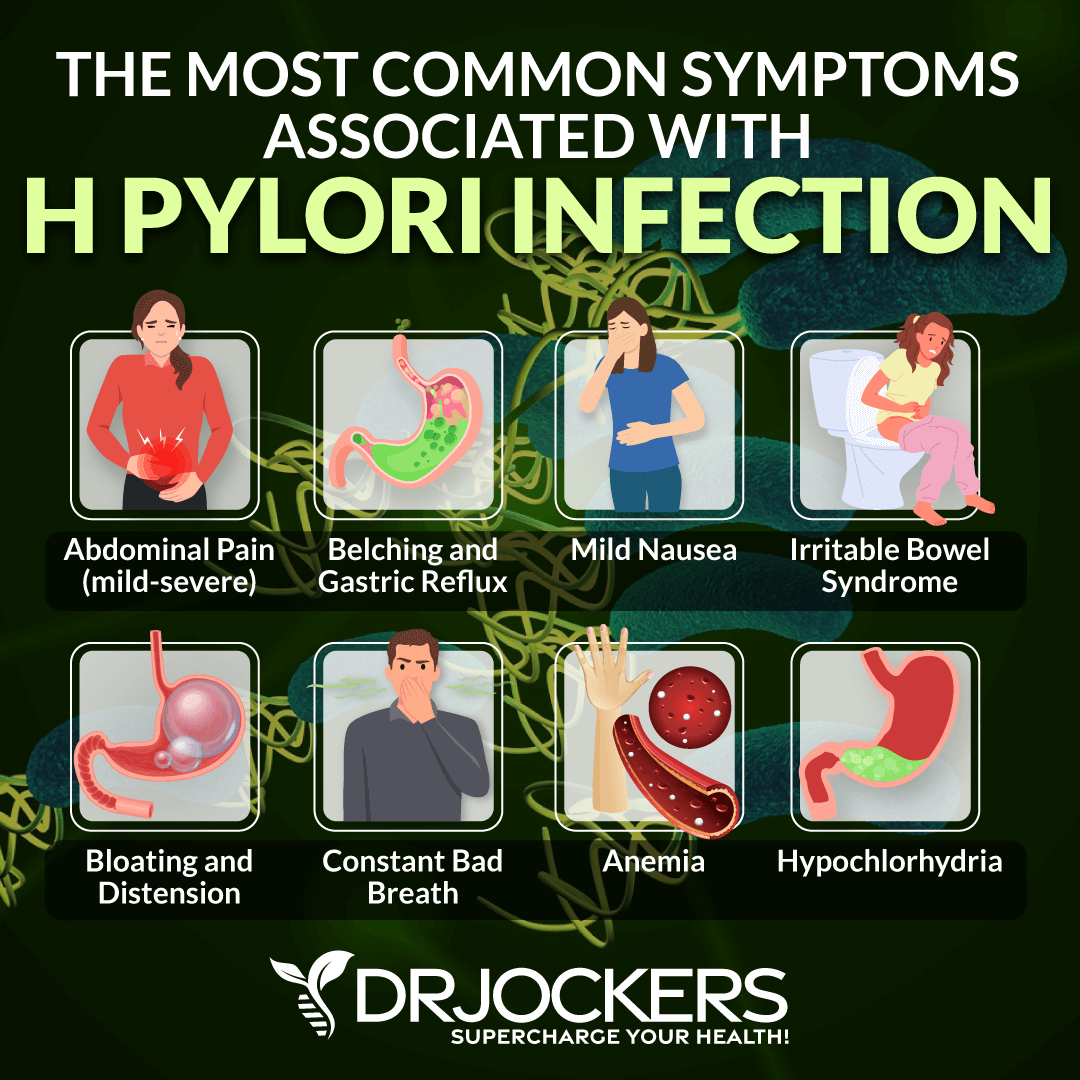
Why H Pylori Infections are Hard to Eradicate
H pylori is a gram-negative bacterium. This means that H pylori has two cell walls, unlike gram-positive bacteria with one cell wall. This double outer layer protects the bacteria, in this case, H pylori.
This makes it more difficult for any antimicrobial herbs, supplements, or pharmaceutical medication to affect the organism. and makes it harder for anti-microbial drugs and herbs to affect the organism. Other gram-negative bacteria include salmonella, E. coli, and shigella, among others, which can be more difficult to clear out.
When it comes to H pylori infections, most conventional healthcare practitioners reach for antibiotics. The problem is that gram-negative bacteria contain “efflux pumps” within their cell walls that have the ability to disperse antibiotic medications.
According to 2003 research published in the Journal of Antimicrobial Chemotherapy, efflux pumps play a role in antibiotic resistance (10). It protects the organism and can be extremely hazardous to the individual.
The efflux pumps help the organism survive, adapt and develop antibiotic-resistant capabilities. A 2023 review published in Antibiotics (Basel) has also found that resistance to antibiotics is an increasing concern in H pylori (11).
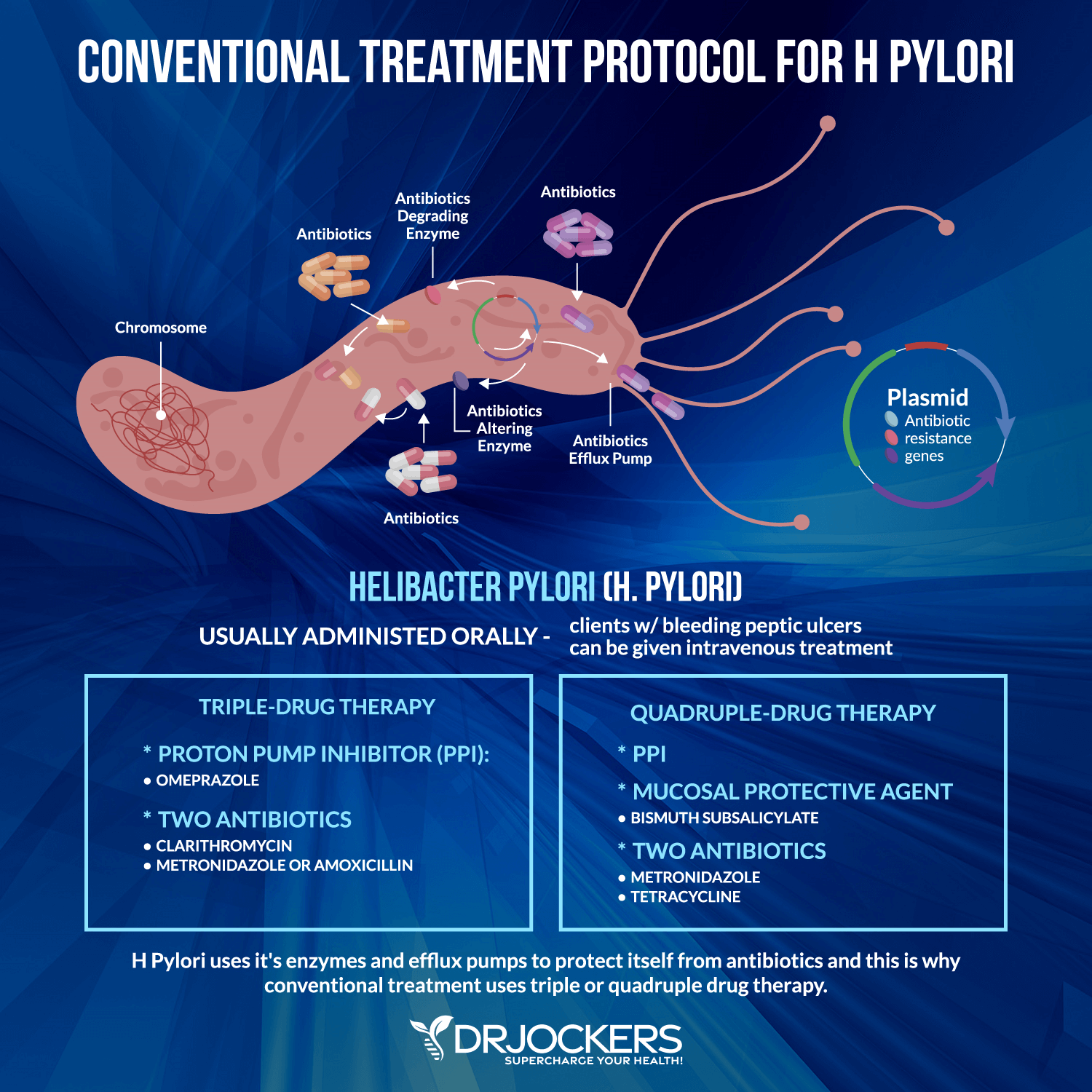
Moreover, the cell wall material of gram-negative bacteria, called lipopolysaccharide (LPS), is also a highly inflammatory mediator. It is toxic to your liver. When it’s released into your bloodstream in high amounts, it may trigger major inflammatory processes in the body (12). According to 2021 research published in Dove Press, LPS may play a role in acute liver and kidney injuries (13).
LPS is an endotoxin which can be incredibly harmful to your body. It may be among the main underlying issues behind leaky gut syndrome and what may make leaky gut so harmful to your health. A 2021 review published in the International Journal of Molecular Sciences has found that LPS may trigger acute inflammatory reactions and cause chronic inflammation (14). It may have highly inflammatory effects on your gut, causing all kinds of havoc, including leaky gut.
When LPS gets into your circulation due to leaky gut, it can increase inflammation and related issues in your body. This inflammation may further trigger gut health issues and leaky gut, resulting in a vicious cycle.

Lab Testing for H Pylori Infections
There are several different ways of testing for an H Pylori infection.
Blood Tests:
These tests look for antibodies to the H Pylori organism and will test for IgA, IgG and IgM reactions. If these antibodies test positive, it is a clear diagnosis of an infectious process. Research has shown that this is a good test for acute infections but long-term infections and individuals with weakened immunity often do not have elevated antibodies.
The other issue with H Pylori antibodies is they may be present even when the infection is under control. This means you will test positive even if you are actually negative, and the organisms are in their proper numbers.
There is also a specific H Pylori pattern on routine blood analysis. This pattern looks at immune cells, total protein levels, phosphorus and blood urea nitrogen (BUN).
The blood pattern for H Pylori is as follows: High or low globulin (below 2.4 g/dL or above 2.8 g/dL), high or low total protein (above 8.0 g/dL or below 6.9 g/dL), high WBC count (over 8.0), high neutrophils (over 60%), low lymphocytes (below 30%), high or low BUN (below 10 and above 16 mg/dL), low phosphorus (below 2.6 mg/dL), normal or high monocytes (over 7%).
My team uses our Comprehensive Blood Analysis to review this pattern and many other biomarkers to assess for H Pylori as well as gastric inflammation, low stomach acid levels, intestinal permeability, insulin resistance, thyroid problems, chronic inflammation and nutrient deficiencies.

GI MAP Stool Testing:
This is the test I use with clients to find out if they are infected. I recommend the GI Map Stool Analysis. This is my favorite gut test to look for dysbiotic flora, bacterial, parasitic, and viral pathogens, potential autoimmune triggers, and all intestinal health markers.
This is the best and most comprehensive gut test I have found, and it helps me tremendously to identify the root cause of my patient’s health issues and help them to repair their bodies and regain their health naturally.
This is the most well-rounded test that looks at H Pylori with great accuracy and also maps out the entire microbiome and looks for a wide variety of pathogens and markers of gut health is the GI MAP stool analysis you can find here. You may also learn about the interpretation of the GI Map Stool Analysis in this article.
Endoscopy:
This is a highly invasive procedure where a scope is inserted into the esophagus and stomach. This is stressful on the body and does a poor job of analyzing for the presence of this infection, but it can see the results of the infection, such as irritation, ulcerations, and cancer in the stomach.
Many mainstream gastroenterologists will use an endoscopy if the diagnosis of H Pylori is present as they want to view the extent of the damage in the stomach.
H Pylori Breath Test:
The H Pylori organism produces urease which breaks down urea in the stomach into ammonia and carbon dioxide. The breath test measures for elevated CO2 that is produced from this reaction.
This is considered the gold standard in H Pylori diagnosis as it consistently produces better results in comparison to many of the other available tests. We offer this breath test here
 Nutrition Strategies for H Pylori
Nutrition Strategies for H Pylori
Are you dealing with symptoms of H pylori? Do you want to improve your health? Here are my top nutrition strategies to use as a foundation in the H pylori protocol to improve your health.
Avoid Sugar, Processed Foods, Fried Foods and Spicy Foods
Certain dietary practices may reduce your body’s ability to fight H pylori bacteria and increase symptoms. Improving your diet may be your first step to recovery.
According to 2014 research published in the Journal of Biomedical Sciences, higher glucose levels may increase the spread of H pylori and may increase the risk-related issues, including gastric cancer (15). A high-sugar processed food diet can increase your blood glucose level, and blood sugar issues, which may increase H pylori growth and related issues.
Moreover, sugar, processed foods, fried foods, and spicy foods may also be triggering acid reflux, stomach pain, and other gastrointestinal symptoms connected to H pylori overgrowth. According to a 2022 study published in Cureus, spicy food may irritate the mucosal lining and increase the risk of gastritis (16). Thus, I recommend avoiding sugar, processed foods, fried food, and spicy food if you are dealing with H pylori overgrowth.
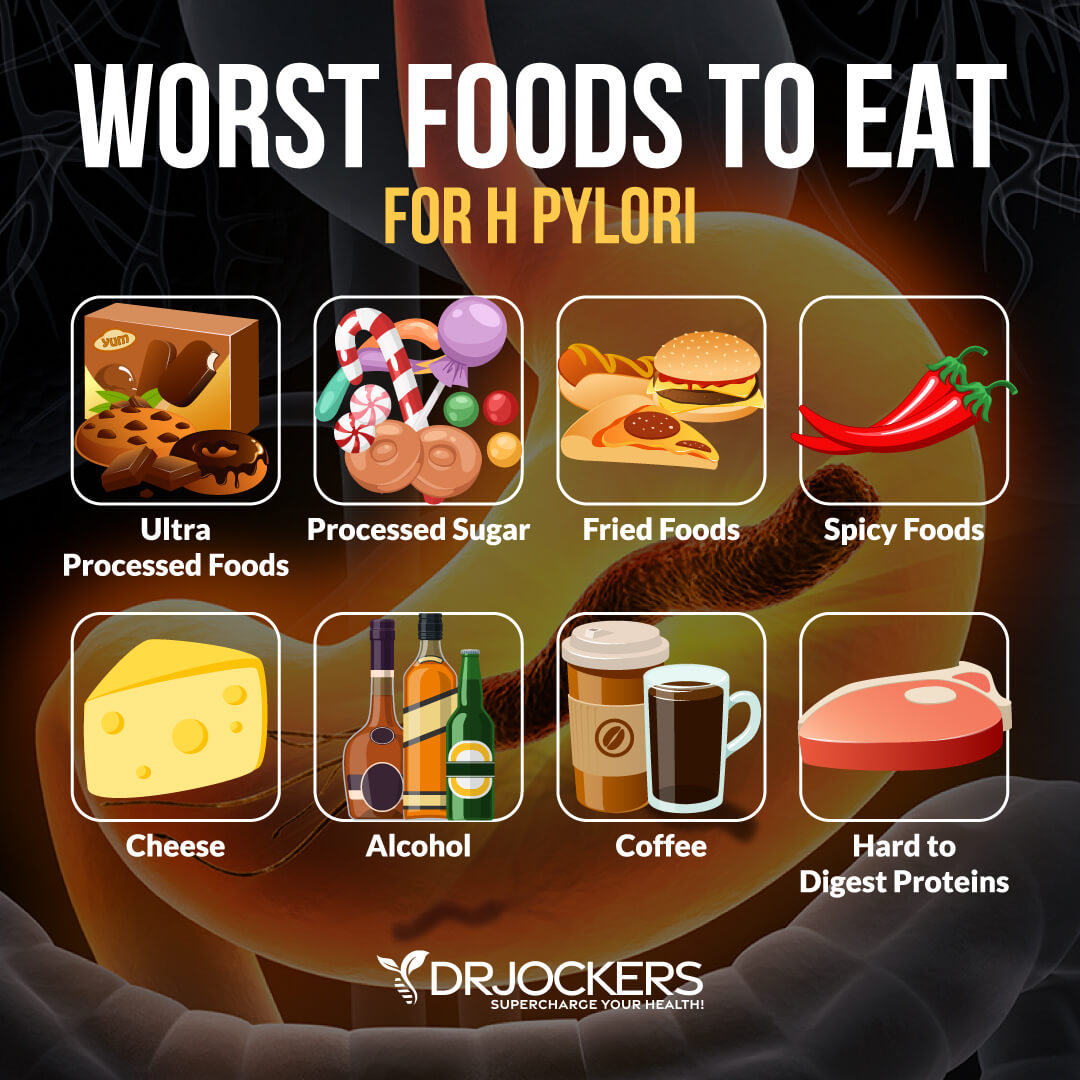
Reduce or Eliminate Cheese
I also recommend being careful with and reducing milk. According to 2018 research published in the World Journal of Gastroenterology, H pylori may be foodborne pathogen that may come from dairy sources, as well as, vegetables, drinking water, and foods of animal origin (17).
Moreover, dairy sensitivities are quite common in our general population. It is a common issue in those with digestive symptoms, gut infections, leaky gut syndrome, and other gut health issues. Dairy may also slow down transit time and sit in the stomach for longer periods, further compromising your digestive health.
If you want to and are able to consume dairy, unsweetened organic Greek yogurt would be a better dairy source for those who can tolerate it. However, some people have trouble with all dairy. Listen to your body.
Focus on Easy-to-Digest Proteins
Since H pylori infections may reduce stomach acid production and cause symptoms, I recommend eating easy-to-digest proteins. Easy-to-digest proteins may be better for poor stomach acid production.
I recommend that you focus on protein powders, well-cooked grass-fed meat, chicken soups and stews, chicken, and fish. Make sure that your meat comes from grass-fed sources, all poultry is pasture-raised, and you consume wild-caught fresh fish to reduce exposure to pesticides, hormones, antibiotics, and other toxins and related inflammation.

Don’t Eat Late at Night
Eating late at night, especially heavier and hard-to-digest meals, may increase acid reflux, indigestion, and gastrointestinal symptoms. According to a 2005 case-control study published in The American Journal of Gastroenterology, there may be a link between GERD and dinner time. They found that participants who had less than 3 hours between their last meal and bedtime had more symptoms compared to those who had 4 or more hours (18).
The digestive system is less active at night and food will not move through the digestive tract as quickly. Food that sits in the stomach creates a breeding ground for bacteria such as H Pylori to overgrow and cause inflammation and alterations in the gut microbiome. Eating late at night on a regular or semi-regular basis will lead to H Pylori overgrowth regardless of the supplemental protocol that you follow.
I recommend that you finish your dinner at least 3 hours before going to bed, ideally more. Don’t let your food sit overnight in your stomach, causing symptoms. Be mindful of your dinner meal and choose foods that are easy to digest and make you feel good, instead of inflammatory foods that only irritate your system.
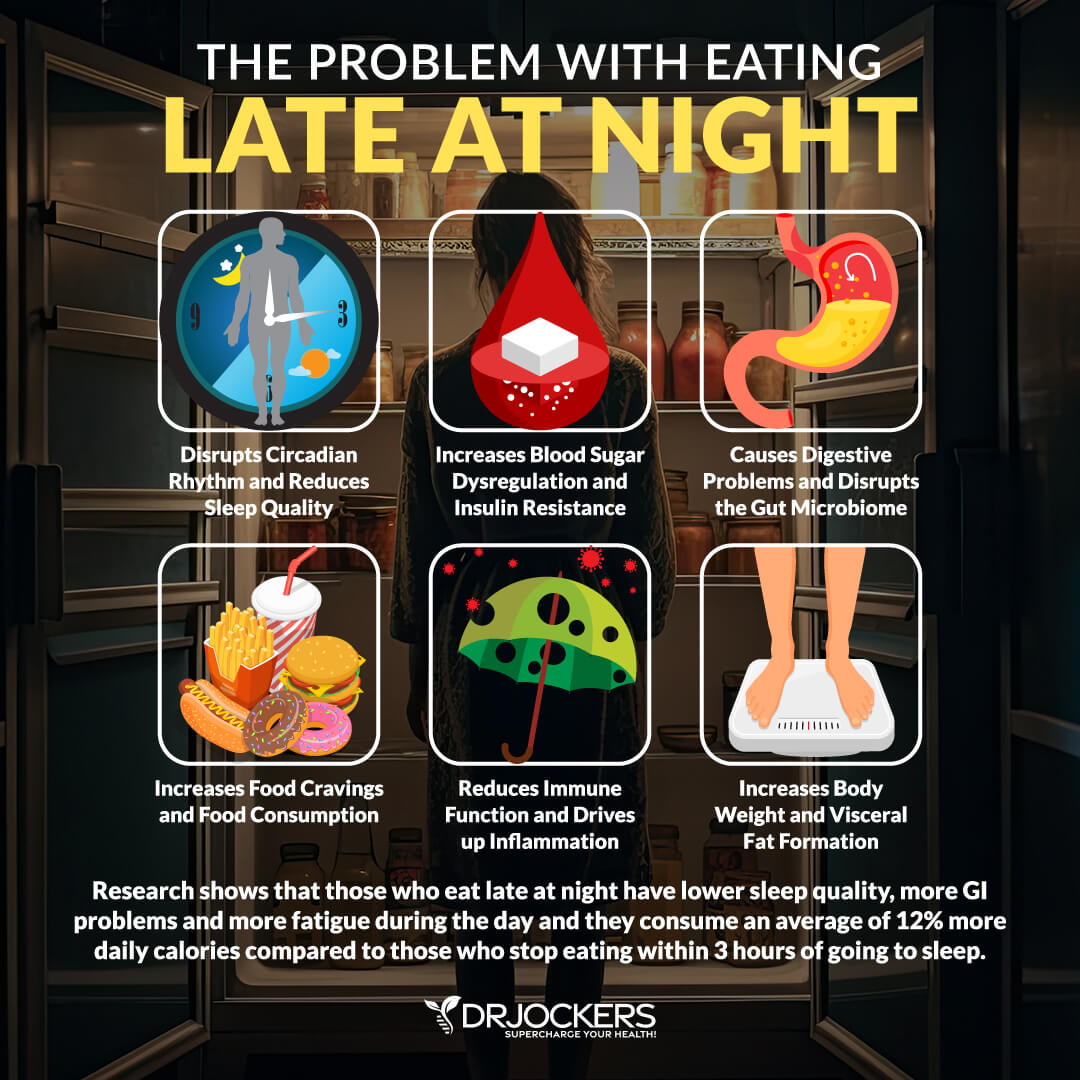
Avoid Alcohol and Coffee
I also recommend avoiding alcohol and coffee. A 2023 cross-sectional study published in Cureus has looked at the effects of coffee and smoking on upper gastrointestinal symptoms (19). They found that while coffee may increase symptoms in people with an active H pylori infection, smoking did not increase it significantly.
A 2017 study published in Clinical Gastroenterology and Hepatology looked at the potential effects of alcohol on H pylori infections in 50 drinkers and 50 non-drinkers (20). They found that whiskey and brandy were more likely to be linked to H pylori infections (over 50 percent), but less likely in beer and wine drinkers.
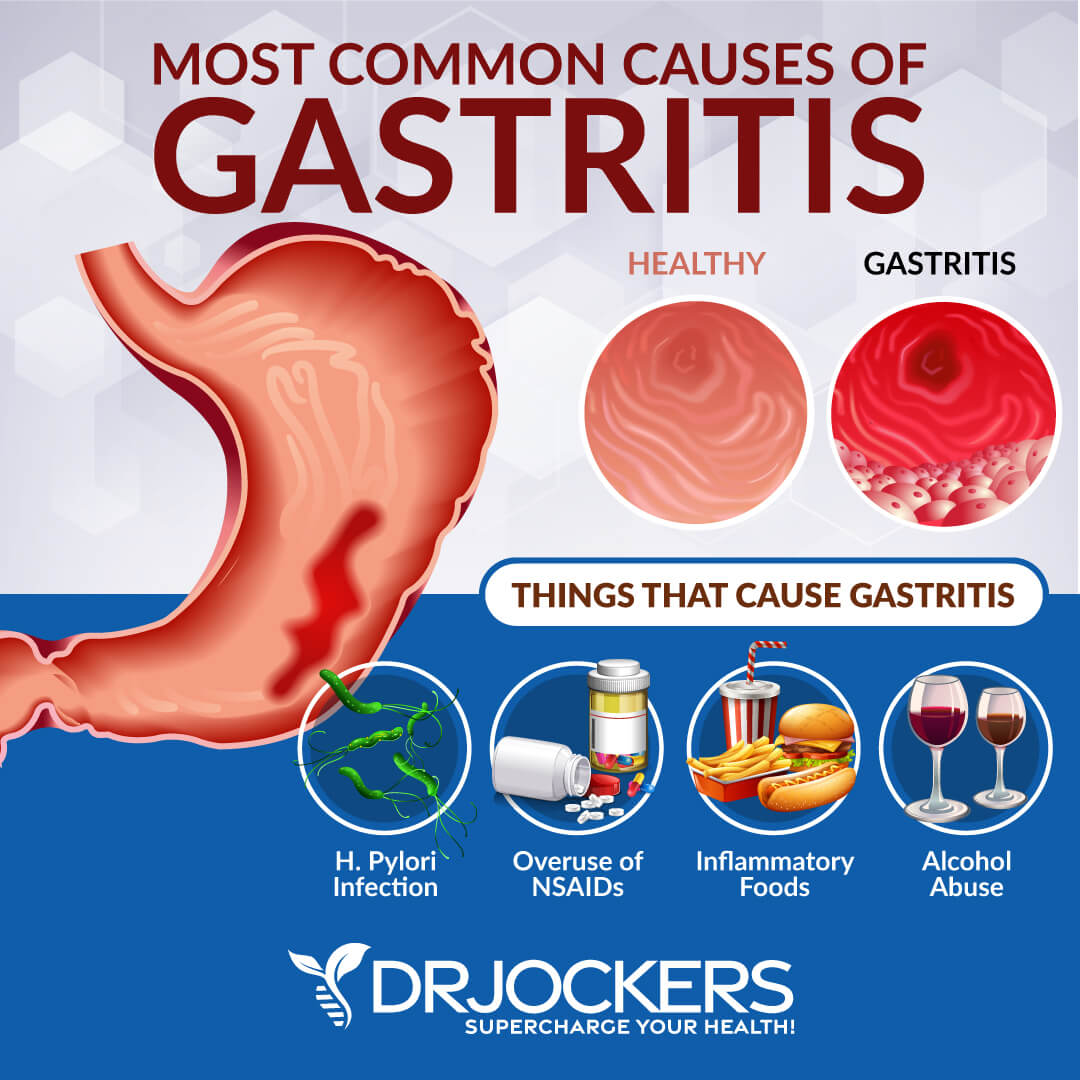
Drink Green Tea and Ginger Tea
You may try drinking green tea and ginger tea to reduce H pylori growth and related symptoms. A 2009 in vivo and in vitro study published in the International Journal of Antimicrobial Agents looked at the bactericidal and/or bacteriostatic effect of green tea against H pylori in animal models with H pylori-induced gastritis (21). They found that green tea may reduce H pylori-related gastric inflammation and symptoms.
A 2021 study published in the Journal of Cancer Prevention has found that steamed ginger extract may have anti-inflammatory benefits (22). They looked at H pylori-infected gastric epithelial cells and found that ginger may have inhibited the H. pylori-activated NF-κB signaling pathway. This may help to improve H pylori-related inflammation and symptoms.
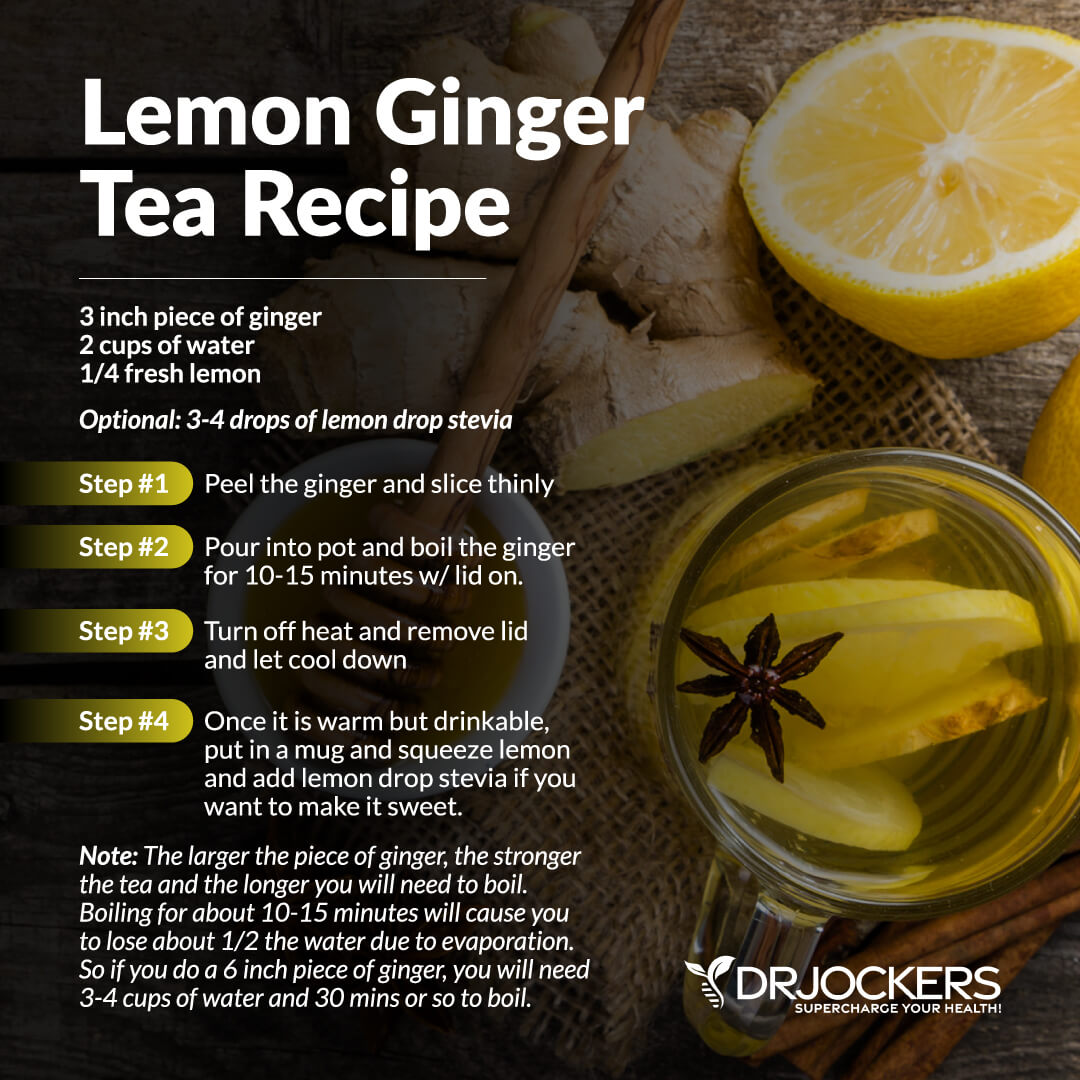
Use High Polyphenol Extra Virgin Olive Oil
A 2007 in vitro study published in the Journal of Agriculture and Food Chemistry has found that in vitro, polyphenols in olive oil may show antibacterial effects against 8 H pylori strains (23). 3 of these strains are resistant to certain antibiotics.
The study showed that the dialdehydic form of decarboxymethyl ligstroside aglycon may have the strongest antibacterial effects even at a very low concentration of μg/mL. However, these effects may still be lower than the benefits of polyphenols in tea, plant extracts, and wine.
A 2022 study published in Frontiers in Microbiology has found that extra virgin olive oil may reduce H pylori growth in vitro and lesions of the gastric mucosa in vivo in mice (24). Using extra virgin olive oil in your diet may help to improve H pylori-related symptoms.
Not to mention that extra virgin olive oil is a healthy fat with all kinds of health benefits. You may learn more about the benefits and best sources of olive oil in this article.
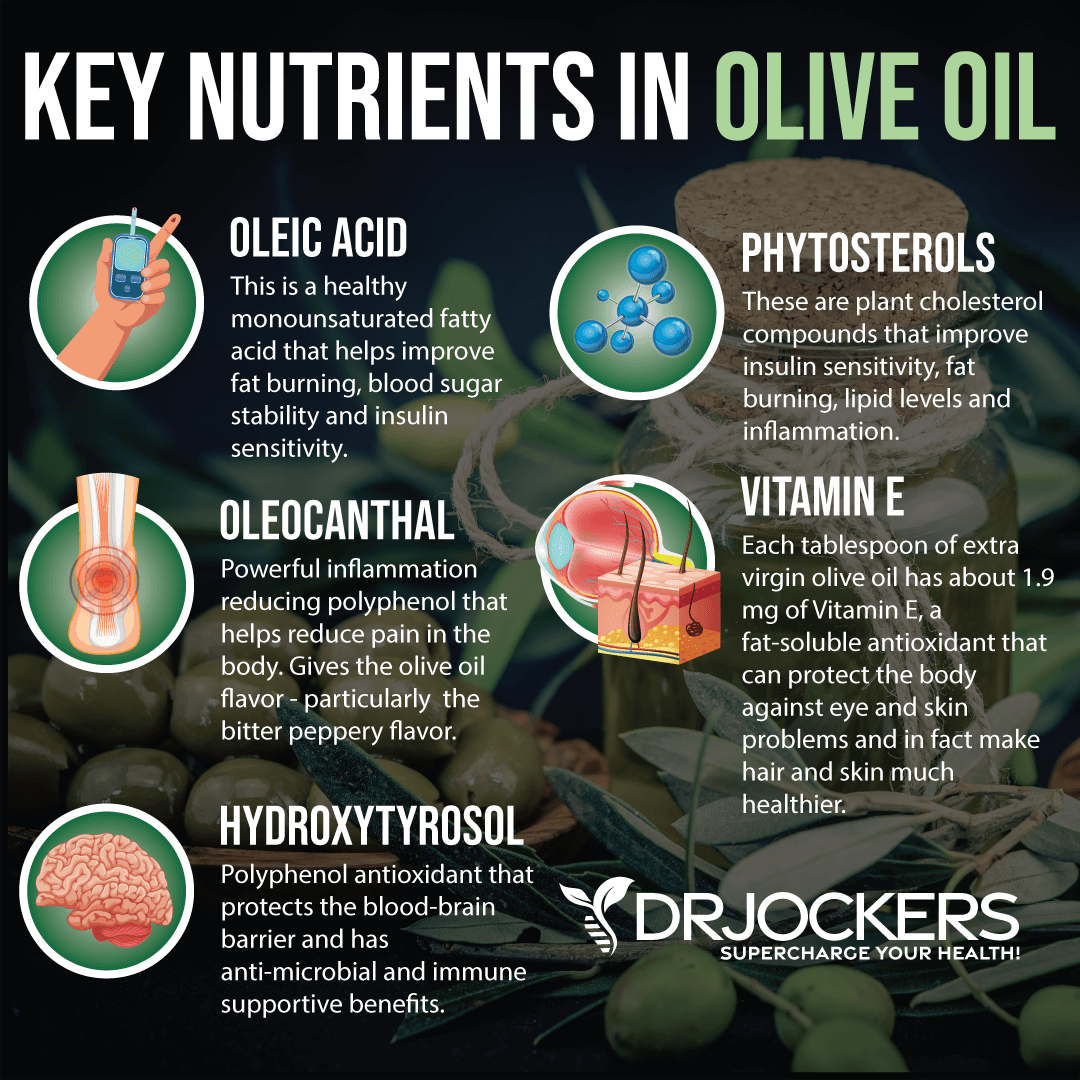
Consume Fruits & Veggies
I recommend consuming lots of greens, vegetables, and fruits to support your gut health and reduce inflammation and microbial activity. I particularly recommend eating cruciferous veggies, such as Brussels sprouts and broccoli sprouts, because of their high sulforaphane levels. Broccoli sprouts are the richest source of sulforaphane.
Sulforaphane has been shown as a great agent against H pylori. According to a 2004 preliminary study published in Digestive Diseases and Sciences, oral broccoli sprout treatment for 7 days helped to improve H pylori in 9 infected patients (25). Researchers found that 78% of patients were stool antigen-negative immediately after the treatment, 66 percent remained negative even of day 35.
A 2009 study published in Cancer Prevention Research (Philadelphia) has found that dietary sulforaphane in broccoli sprouts may help to reduce H pylori-related gastritis in mice and humans (26). Researchers found that 2 months of this treatment may offer chemoprotection of the gastric mucosa against oxidative stress from H pylori infection.

Consume Garlic & Raw Honey or Manuka Honey
I also recommend adding garlic, raw honey, or manuka honey to your diet. They have shown antimicrobial effects and may help to improve H pylori. A 2017 review published in Winter has looked at the potential effects of food, supplements, and alternative medicine in multi-drug resistant H pylori (27). They found that honey and propolis may have positive effects in those with H pylori.
A 2016 study published in the Archives of Medical Research has found that manuka honey may stop H. pylori-induced NF-κB and AP-1 and downregulate of COX-2 expression (28). Thus manuka honey may help to reduce H. pylori infection.
A 2016 study published in the Avienna Journal of Phytomedicine has looked at the antibacterial effects of garlic in H pylori (29). Using a urease breath test, they found that using 3 grams or 2 medium-sized garlic with a meal twice a day for 3 days may lower H pylori.

Consume Fermented Foods
Fermented foods also offer gut health benefits. A 2016 review published in Frontiers in Microbiology has found that fermented foods and probiotics may help to reduce H pylori and the risk of peptic ulcers and gastric cancer (30).
Fermented foods such as sauerkraut, kimchi, pickles, pickled ginger, and other fermented vegetables all contain organic acids, enzymes, and probiotics which help to improve digestive juice secretions.
Fermented drinks such as apple cider vinegar, coconut kefir, and kombucha offer antimicrobial benefits and help to reduce H Pylori and improve stomach acid levels. I recommend eating fermented foods with your meals, especially with heavier meals and meals with protein.
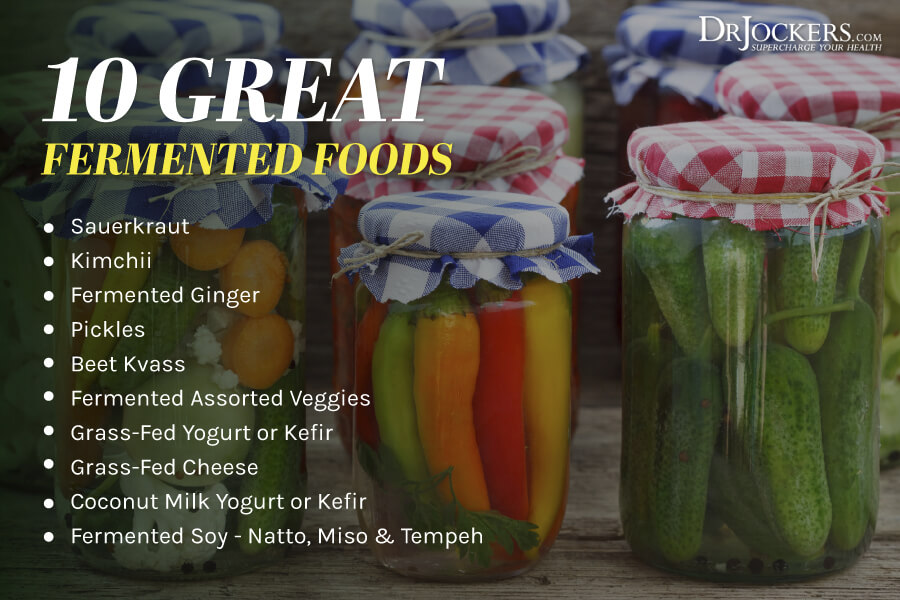
Consume Aloe Vera Juice & Gel
Adding aloe vera juice or gel to your diet may also help to fight H pylori infection and reduce symptoms. A 2014 study published in Letters in Applied Biology has found that aloe vera inner gel may be able to fight some H pylori strains (31). Researchers found that it may be a good combination with antibiotic treatment.
2022 research published in Polymers (Basel) has also found that aloe vera may be effective against H pylori (32). They found that using chitosan nanoparticles (CSNPs) with aloe vera may enhance the hemolysis inhibition and reduce H pylori activity.
If you want to experience the benefits of aloe vera, you may drink aloe vera juice as is. You can also add a piece of aloe vera or aloe vera juice to your lemonade, smoothies, shakes, or green juice.
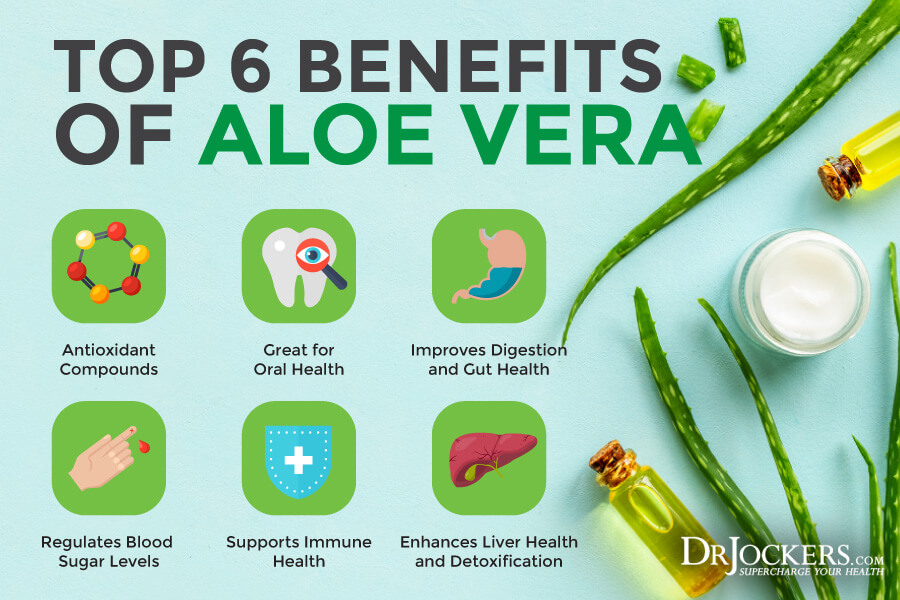
H Pylori Protocol Using Targeted Supplements
Combined with nutritional strategies, stress reduction, good sleep, sun exposure, reduced toxin exposure, and other healthy lifestyle activities, certain supplements may help to reduce H pylori infections and symptoms. Here are the targeted supplements I recommend as an H pylori protocol.
H Pylori Protocol: GI Clear
We use GI Clear as a key component of the H Pylori protocol. This is a great supplement with herbs that can be used to reduce the microbial load and be an important part of re-establishing a healthy microbial balance.
Berberine may provide strong anti-microbial effects against bacteria, parasites, and yeast, including H pylori. A 2020 systematic review and meta-analysis of 13 studies published in Frontiers in Pharmacology using berberine-containing quadruple therapy may help to reduce H pylori infections, improve symptoms, and accelerate the healing of ulcers (33).
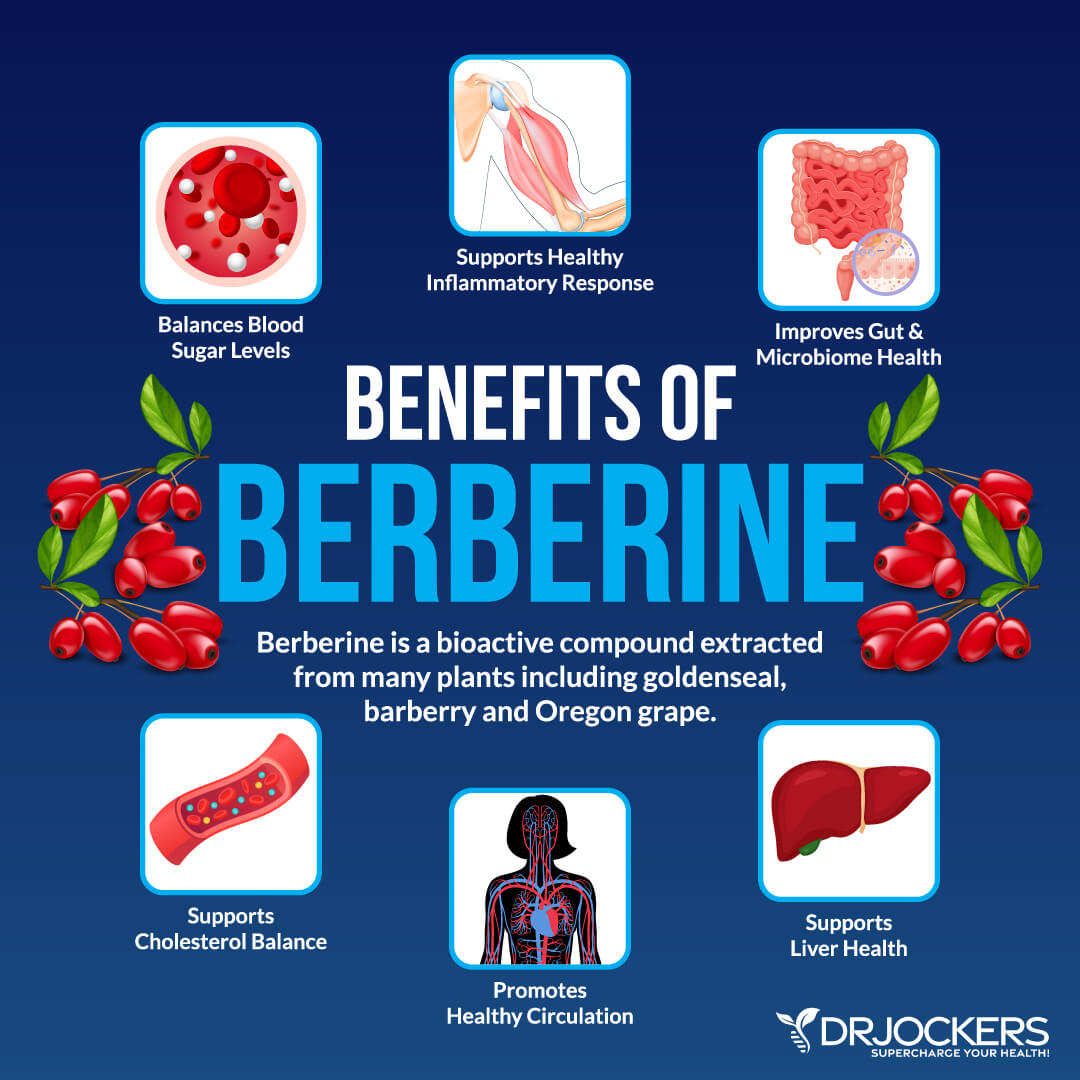
Black walnut extract contains a cytotoxic compound called juglone found in walnuts that offers powerful anti-microbial, anti-parasitic properties (34). It also acts as a mild laxative that helps expel the waste products of dead bacteria and parasites.
According to a 2018 in vitro study published in Oxidative Medicine and Cellular Longevity, using a series of juglone derivatives may help H pylori infections (35). Researchers found that most phenylamino juglones were more beneficial than metronidazole, which is a H pylori growth inhibitor.
Bearberry extract is a powerful anti-microbial that is effective at regulating healthy gut microflora and preventing urinary tract infections. According to a 2003 review published in Food Control, bearberry may help to reduce food-related bacteria (36). Its active compound, arbutin may be responsible for its antimicrobial activity. It also contains ursolic acid and quercetin for further therapeutic benefits.
Sweet wormwood, also known as Artemisia annua, is one of the bitterest herbs on the planet, and this bitterness works to drive out worms and parasites. It works to break down iron bridges in the pathogenic organism, causing massive oxidative stress and death of the parasite.
According to 2012 research published in Antimicrobial Agents and Chemotherapy, sweet wormwoods and its derivatives may have reduced H pylori and may be beneficial for antibiotic-resistant infections (37).
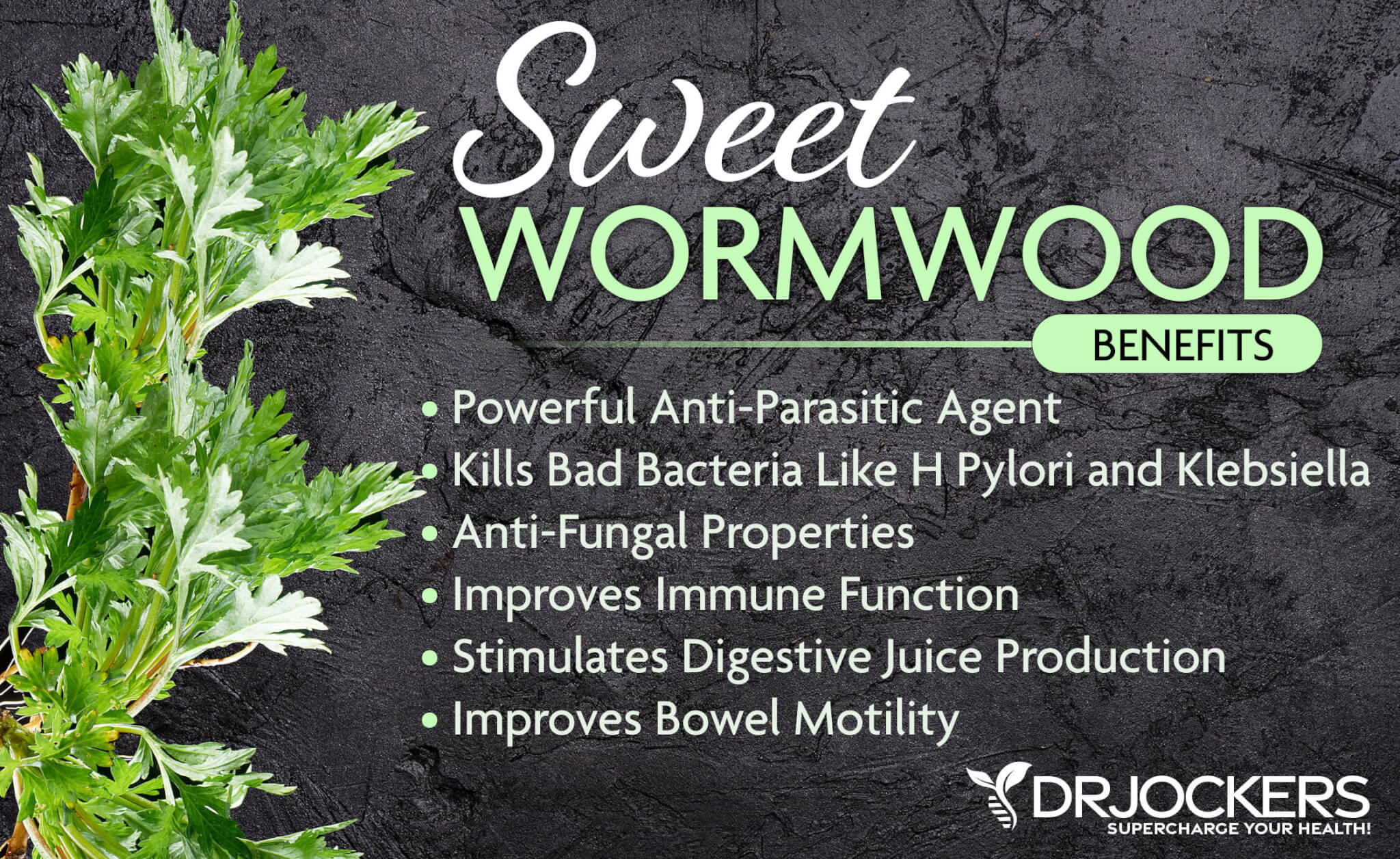
Tribulus extract comes from tribulus, a flowering plant that is renowned in southern Europe and the Middle East. According to a 2008 paper in the Journal of Zhejiang Unversity of Science B, it may have strong anti-microbial effects against 11 pathogenic microbes including Staphylococcus aureus, Corynebacterium diphtheriae, Escherichia coli, Proteus vulgaris, Serratia marcescens, Salmonella typhimurium, Klebsiella pneumonia, Pseudomonas aeruginosa and Candida albicans (38). According to a 2019 study published in the Arab Journal of Chemistry, tribulus extract may help drug-resistant H pylori (39).
Magnesium caprylate, also called octanoic acid, is a naturally occurring medium-chain fatty acid that provides support for healthy yeast and Candida balance, supports the intestinal mucosal cells, and supports its ability to get deeper into the gastrointestinal tract. According to 1996 research published in Antimicrobial Agents and Chemotherapy, medium chain monoglycerides and free fatty acids may have antibacterial properties on H pylori (40).
Barberry extract may also be helpful for H pylori. Barberry (Berberis vulgaris) is one of the plants that contain berberine and has had a long history in Eastern and Western medical traditions.
It has anti-inflammatory benefits and may be helpful for a variety of disorders, such as diabetes, liver disease, gallbladder pain, digestive, urinary tract diseases, and gallstones. A 2022 study published in Avicenna Journal of Phytomedicine showed that barberry extract may have antioxidant effects, inhibitory activity on H pylori growth, and gastrointestinal benefits “mediated through modulation of nitric oxide synthase (iNOS) gene expression: activation of endothelial nitric oxide synthase (eNOS) and inhibition of inducible nitric oxide synthase (iNOS)” (41).
GI Clear contains all these herbs to help improve H pylori infections and gastrointestinal symptoms. I recommend that you take 1 capsule per day on an empty stomach. For an advanced dose, take 1 to 2 capsules, 2 times per day on an empty stomach or as directed by your health care practitioner.
H Pylori Protocol: Gastro Soothe
I also recommend Gastro Soothe on the H Pylori protocol. It contains vitamin C, mastic gum, DGL, and zinc carnosine.
Vitamin C is a fantastic vitamin for immune health and fighting microbes. According to a 2018 study published in Cureus, vitamin C may work as a preventative and therapeutic agent against H pylori infections by working as an antioxidant, “inhibitor of urease, a potential collagen synthesizing agent, and a stimulant in prostaglandin synthesis” (42).
Mastic gum comes from the trunk and branches of the mastic tree and has many potential health benefits. According to a 2014 review published in Integrative Medicine Research, mastic gum is among one of the potential natural therapeutic agents for H pylori (43).
DGL or deglycyrrhizinated licorice has many potential health benefits, especially for acid reflux, peptic ulcers, and canker sore. According to a 2014 study published in Pharmacognosy Research, DGL may be as effective for H pylori as bismuth in peptic ulcer (44).
Zinc is an essential mineral with immune health benefits. It may also be beneficial for your gut health. According to a 2022 research published in Clinics and Research in Hepatology and Gastroenterology, zinc l-carnosine may help improve the gastrointestinal mucosal, increase H pylori eradication, and support the treatment of ulcers and other gastrointestinal mucosal diseases (45).
To benefit from using these nutrients for H pylori, I recommend Gastro Soothe. Use one capsule twice a day or for advanced doses, two capsules twice a day, or as directed by your healthcare professional.
H Pylori Protocol: PyloGuard
I also recommend using PyloGuard for a successful H Pylori Protocol. PyloGuard™ is a dietary supplement designed to support the body’s natural processes for elimination.
It contains patented Lactobacillus reuteri DSM17648, which can attract specific organisms in the intestine and support their removal via the digestive tract. This particular strain of L. reuteri specifically binds to H. pylori in the stomach and supports overall digestive health.
A 2018 single-blind, placebo-controlled study on 24 adults with H pylori published in BMC Nutrition has found that a 28-day supplementation has helped to reduce H pylori in over 60 percent of patients (46). A 2023 randomized, double-blind, placebo-controlled trial published in Helicobacter has found that Lactobacillus reuteri DSM 17648 may help to improve H pylori and symptoms, including indigestion, constipation, abdominal pain, and headaches (47).
PyloGuard may be a great supplement for H pylori, according to these research results. I recommend using 1 capsule into 8 oz of water and drinking once daily on an empty stomach. For children under the age of 9, please consult your healthcare practitioner.
H Pylori Protocol: Gut Repair
You may also benefit from using Gut Repair on the H Pylori Protocol. This supplement combines the power of 4 compounds, L-Glutamine, Deglycyrrhizinated Licorice Extract, Arabinoglactan, and Aloe Vera Extract.
You have already learned about the benefits of aloe vera and DGL earlier in this article. Arabinogalactan is a starch-like chemical that is found in many plants. According to a 2014 study published in Molecules, arabiogalactan from ribes nigrum seeds may have antiadhesive effects that may counteract the adhesion of H pylori (48).
Glutamine is the most abundant amino acid with many health benefits, including for gut health. A 2017 case report published in the Asian Journal of Pharmaceutical and Clinical Research, l-glutamine may have antioxidant benefits and may help to reduce H pylori gastritis and decrease oxidative damage to gastric mucosal cells (49).
A 2014 review published in Glutamine in Clinical Nutrition has found that glutamine supplementation may support H pylori recovery and support cell survival mechanisms, colonization, and growth (50). Add Gut Repair to your H pylori protocol to improve your health.
H Pylori Protocol: Mega IgG Powder
Finally, I recommend that you consider Mega IgG 2000 Powder to help support the H Pylori protocol. This supplement may help to maintain the gut barrier function.
Immunoglobulin G (IgG) is the most abundant antibody in the system and can be found in blood and extracellular fluid, allowing it to control infections in the body. IgG antibodies can bind a variety of pathogens, including bacteria, viruses, and fungi, as well as their toxic by-products.
Binding these toxins will neutralize them and allow the immune system to safely remove them from the body. Using this supplement may help to reduce die-off effects when using an antimicrobial protocol, such as recovering from H pylori.
Take 1 scoop daily with or without food or as directed by your healthcare practitioner. Mix powder into 16 oz. of cold water or liquid of your choice. Stir for 20 seconds. For children under the age of 2, please consult your healthcare practitioner. Drink plenty of fluids.
H Pylori Protocol Conclusion
H pylori is a bacterium that grows inside your digestive tract and can damage your stomach’s protective lining causing chronic symptoms and health issues. H pylori infections are incredibly common. They are also difficult to eradicate, as they can be resistant to antibiotic treatment.
Using supplementation, nutrition, and lifestyle strategies may help to improve your health. I recommend following my nutrition strategies and H pylori protocol using targeted supplements to reduce H pylori and improve your health.
If you want to work with a functional health coach, I recommend this article with tips on how to find a great coach. On our website, we offer long-distance functional health coaching programs. For further support with your health goals, just reach out—our fantastic coaches are here to support your journey.
Inflammation Crushing Ebundle
The Inflammation Crushing Ebundle is designed to help you improve your brain, liver, immune system and discover the healing strategies, foods and recipes to burn fat, reduce inflammation and Thrive in Life!
As a doctor of natural medicine, I have spent the past 20 years studying the best healing strategies and worked with hundreds of coaching clients, helping them overcome chronic health conditions and optimize their overall health.
In our Inflammation Crushing Ebundle, I have put together my very best strategies to reduce inflammation and optimize your healing potential. Take a look at what you will get inside these valuable guides below!










Hi, I am Verica Markovic, my diet is plant based, gluten free, no sugar healthy 84 years old until few weeks ago. Now I have all the simptoms of H pylori. How can that be. I went to Kaiser yesterday, they took a blood test and later I took stool semple, Don’t have the results yet. Meanwhile I take Mastic Gum, and probiotics. I am loosing weight (I can’t afford to loose) and my digestion is uncomfortable. Can you tell me anything. Thank you
Verica49@ yahoo .com (916-485-5420)
is oregano oil good for h pylori infections and gastritis? By the way this site has helped me a lot, thank you Dr. Jockers. My husband and I are christians as well, its nice to see and Dr. that believes as well.